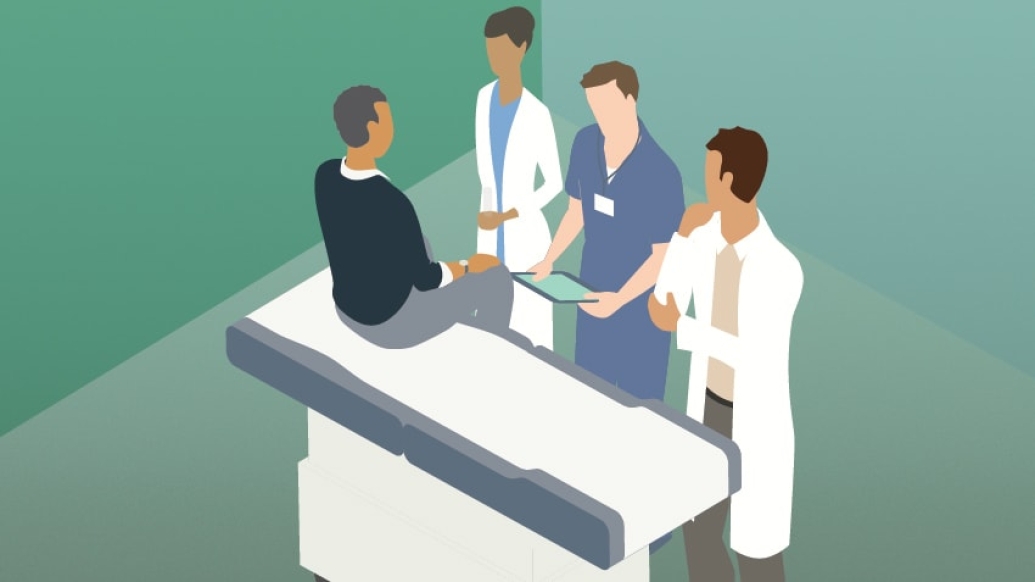A Michigan Medicine clinic provides a one-stop shop for patients discharged from an intensive care unit who lack doctors and other resources.
1:00 PM
Author |

After a discharge from an intensive care unit, there's often reason to be optimistic.
"It's interesting, because we all celebrate when a patient survives a severe critical illness and is able to go home, but really that's only half of the battle," says Jakob McSparron, M.D., assistant professor of pulmonary and critical care medicine at Michigan Medicine.
MORE FROM MICHIGAN: Sign up for our weekly newsletter
The reason: Recovery doesn't end when a patient is discharged.
Many ICU patients experience cognitive, physical and emotional limitations that persist after hospitalization, McSparron says. And those who lack adequate follow-up care may be at risk of ending up back in the hospital.
It's why a new clinic at Michigan Medicine was established to help these patients get timely and thorough follow-up care.
The University of Michigan Post ICU Longitudinal Survivor Experience Clinic (U-M PULSE) is one of just a few such clinics in the country. It opened in March in the Michigan Medicine Taubman Center; patients do not need a referral to be seen.
McSparron, the clinic's director, explains how the model works:
It targets people without resources
The clinic treats an at-risk population: people who have left the hospital but may not have support or adequate care options already established.
"We're hoping to help patients who may fall through the cracks," McSparron says. "Many people are not connected with a support system and health care providers. For example, a 30-year-old who was completely healthy, became critically ill, and now is just not able to return to their normal routine."
Although U-M PULSE is targeting Michigan Medicine ICU patients, it's also open to those who have recently stayed in an ICU elsewhere.
Care is thorough — and ongoing
Ideally, a patient doesn't wait long to pursue the clinic's services following ICU discharge.
SEE ALSO: 3 Tips for Seniors Visiting the Emergency Department
"This first visit is crucial and should take place two to four weeks after the patient leaves the hospital," McSparron says. "This visit is where the patient's care plan is put into place, and we will maintain regular contact with them following this visit." Patients return to the clinic about six months later.
The first visit should last two hours, McSparron notes. And because it's a multidisciplinary clinic, patients will be seen by a pharmacist, social worker and physician all in the same visit.
Multiple specialists are involved
Patients begin their initial appointment by filling out surveys designed to evaluate quality of life, limitations patients are experiencing and the impact of their illness on caregivers. Next comes testing, which includes evaluations for pulmonary function, fitness and mobility.
Patients then will meet with a pharmacist for a comprehensive medication review. They also see a social worker to review the surveys and receive cognitive testing. Family members or other caregivers are welcome to participate in the social work consultation.
The visit concludes with a physical clinical evaluation and medical review.
Doctors work together to find solutions
All U-M PULSE providers meet to discuss their respective exams and recommended follow-up care — such as medication changes, physical therapy, seeing a sleep therapist and nutritional counseling.
The team then sees the patient to outline the care plan and help facilitate any referrals. They'll also schedule a six-month follow-up visit; virtual check-ins can take place sooner if necessary.
Research fuels the clinic model
The new clinic is built upon previous Michigan Medicine research examining the need for proper post-discharge follow-up care for sepsis survivors. More than 1.5 million people acquire sepsis each year in the United States, with 250,000 of those dying from the infection.
SEE ALSO: Urgent Care vs. the Emergency Room: What's the Difference?
For recently discharged ICU patients, especially those affected by sepsis, problematic symptoms may include anxiety, fatigue, cognitive impairment, trouble swallowing and difficulty sleeping.
"While we will definitely treat patients recovering from other critical illnesses, sepsis appears to be one illness we expect many of our patients to be recovering from," McSparron says.
To learn more about the U-M PULSE Clinic and see if you are eligible for treatment, click here.

Explore a variety of healthcare news & stories by visiting the Health Lab home page for more articles.

Department of Communication at Michigan Medicine
Want top health & research news weekly? Sign up for Health Lab’s newsletters today!





